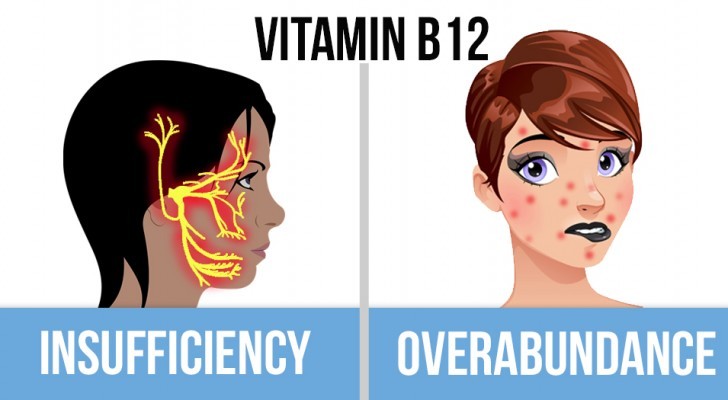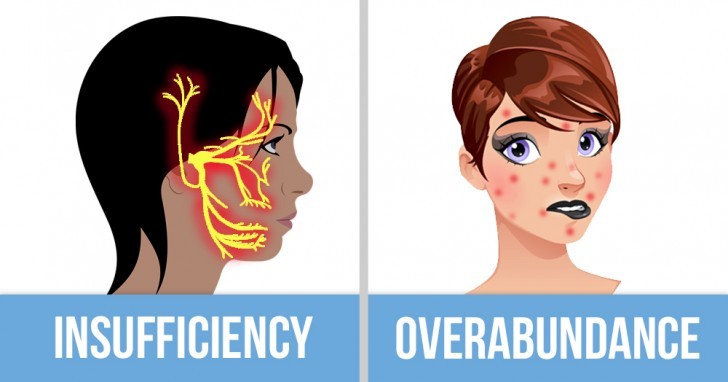6 important things to know about essential vitamins and vitamin deficiencies

One of the most immediate consequences of an unbalanced diet is the lack of vitamins in the body.
To ensure that your metabolism is well regulated and that cellular functions are performing at their best, however, there is a need to keep these essential nutrients at the right levels, otherwise, your health will be negatively affected in the long run.
Here is how you can identify a vitamin deficiency and interpret certain signals that the body sends us.
What are the effects of the main vitamins in the human body?

Vitamin A
- Regulates bone growth and increases resistance to the contraction of respiratory infections.
- Symptoms of deficiency are dry, wrinkled, and flaky skin.
- Symptoms of excessive vitamin A intake are the loss of appetite, nausea, headache, and photophobia.
Vitamin B
- Regulates the production of antibodies and blood cells; intervenes in the functioning of the nervous system.
- Symptoms of deficiency are skin irritations, injuries to the oral cavity.
- Symptoms of excessive vitamin B intake are numbness of legs and arms, acne.
Vitamin C
- Interacts in the production of collagen, contributes to the health of bones and teeth.
- Symptoms of deficiency are inflammation of the gums, pain in the joints, the appearance of edema.
- Symptoms of excessive vitamin C intake are kidney stones, fatigue, headache, vomiting.
Vitamin D
- regulates calcium absorption, essential for bone growth.
- Symptoms of deficiency are rickets, bone fragility, muscle weakness, intercostal pains.
- Symptoms of excessive vitamin D intake are excess of calcium in the blood, nausea, diarrhea.
Vitamin E
- contributes to the health of the immune system, eliminates free radicals.
- Symptoms of deficiency are irritability, muscle weakness, difficulty in concentration.
- Symptoms of excessive vitamin E intake are the interruption of blood coagulation, hemorrhages.
How can one recognize a deficiency in one of them?

designed by Ddraw - Freepik.com
1. Skin
- dry or flawed
- slow healing even of small wounds
- dull and opaque
2. Nails
- opaque
- fragile
- which do not improve with the use of specific products
- with spots, horizontal lines and depressions
3. Hair
- hair loss
- brittle
- dull and gray
4. Nervous system
- insomnia
- depression
- poor ability to concentrate
- fatigue and apathy
Warning: Symptoms due to vitamin deficiency are also common to other diseases and conditions. If you think, you are experiencing a case of vitamin deficiency, ask your doctor about the appropriate clinical tests.
Be aware that some medicines can interfere with the absorption of specific vitamins.

Taking certain medicines and medications can affect the normal absorption of vitamins in the body. Here are some examples:
- Aspirin: decreases calcium levels and vitamin A, B, and C.
- Antibiotics: reduce levels of magnesium, calcium, iron, and vitamin B.
- Diuretics: reduce the amount of potassium, magnesium, zinc, and vitamin B.
- Laxatives: hinder the absorption of vitamins A, E, and D.
- Anticoagulants: they inhibit the functionality of vitamin K and E.
How to promote the absorption of these nutrients? It takes the right combination!

- Vitamin A: absorption and accumulation of vitamin A is favored by vitamin B, D, and E, phosphorus, calcium, and zinc.
- Vitamins B: absorption is favored by vitamin C.
- Vitamin C: improves intestinal absorption of iron and calcium.
- Vitamin D: advantageously used when added to vitamin A and stimulates absorption in the gastrointestinal tract of calcium and phosphorus.
- Calcium: calcium supplements should not be taken concomitantly with those containing iron.
In conclusion, here is a mini-guide to foods that contain the largest quantities of some basic vitamins:

- Vitamin A: fish oil, animal liver, cheese, eggs.
- Vitamin B6: eggs, potatoes, legumes, sprouted seeds, bran, melons, bananas, raisins.
- Vitamin C: currants, raspberries, lemons, strawberries, cabbage, spinach.
- Vitamin D: sardines, salmon, mackerel, animal liver.
- Vitamin B12: fish liver, seafood, eggs, cheese, meat.
- Vitamin E: vegetable oil, wheat germ, hazelnuts, corn, eggs.
- Niacin (Nicotinic acid): prunes, dried apricots, figs, dates, wild strawberries.





